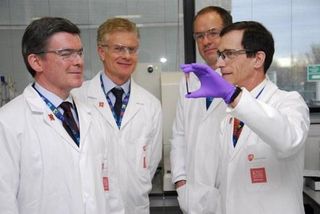Olympic Games anti-doping lab unveiled
WADA and LOCOG push for cleanest Olympics

The London Organising Committee of the Olympic and Paralympic Games (LOCOG) today unveiled the WADA-accredited laboratory that will provide drug testing and analysis during the London 2012 Olympic Games.
Over 6,250 tests are planned during the Games, more than at any other Olympic competition, with the laboratory set to operate 24 hours a day. Professor David Cowan from the Drug Control Centre at King’s College London will oversee scientific operations, which will aim to have 24 hour turnarounds on some samples.
In total 1000 staff will be employed by LOCOG with 150 anti-doping scientists. The facility has been provided by pharmaceutical giant GlaxoSmithKline (GSK).
“These laboratories are the most high-tech labs in the history of the Games, analysing more samples than ever before,” Professor Cowan said.
“We have developed, with GSK support, super-fast and super-sensitive technologies to be able to detect use of prohibited substances. Our role is to ensure the efficient and effective operation of the lab to deliver robust anti-doping testing for the Games.”
“The Anti-Doping process during the London 2012 Games will create a legacy of knowledge about operations and processes. In July 2011, GSK signed an agreement with the World Anti-Doping Agency (WADA) to share information about its medicines in development, while LOCOG will debrief on all processes.”
Organisers are planning to test one in two athletes at the Olympic Games, and WADA have attempted to tighten the noose on cheats by working with Interpol and border-control agencies in the lead-in to the 2012. WADA believe that this measure is a cheaper and more effective way of dealing with drugs in sport.
Get The Leadout Newsletter
The latest race content, interviews, features, reviews and expert buying guides, direct to your inbox!
In November the UCI and UKAD announced that they would share biological passport data.
Most Popular

